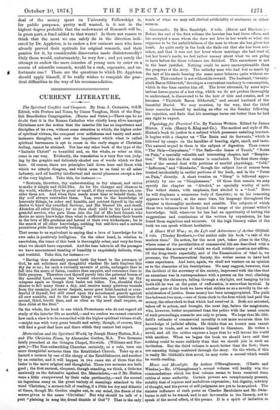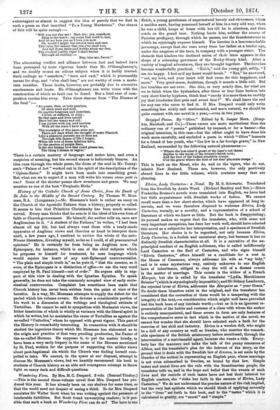Music and Moonlight. By Arthur O'Sbaughnessy. (Chatto and Windus.)—Mr. O'Shaughnesay's
second volume will hardly win the commendations which his first volume seems to have received from critics of some authority. Certain powers are conspicuously present, notably that of copious and melodious expression; but dignity, sobriety of thought, and the power of self-judgment are yet to he acquired. The sinister influence of such poets as Charles Bandelaire and Mr. Swin- burne is still to be traced, and is not favourable to the literary, nett.° speak of the moral effect, of the poems. It is a spirit of imitation so
extravagant as almost to suggest the idea of parody that we find in each a poem as that inscribed "To a Young Murderess." One stanza of this will be quite enough :—
- Will you not slay me? Stab me; yea, somehow, Deep in the heart: ray some foul word to last, And let me bate you as I love you now.
Oh, would I might but see you turn and cast That false fair beauty that you e'en shall lose.
And fall down there and writhe about my feet, The crooked loathly viper I shall bruise Through all eternity:—
Nay, kiss me, Sweet!"
The alternating conflict and alliance between lust and hatred have been portrayed by more vigorous hands than Mr. O'Shaughnessy's, and we doubly resent an odious subject when it is feebly treated. Such endings as "somehow," "turn and cast," which is presumably meant for drop, and "e'en shall lose," are not worthy of even a mode- rate versifier. These faults, however, are probably due to excessive carelessness and haste. Mr. O'Shaughnessy can write verse with the construction of which no fault can be found. But a fatal ease of com- position carries him away. Take these stanzas from The Disease of the Soul ":—
"As queen, then, or lady peerless, Or siren cruel and cold, Or captive forgotten and cheerless, I lived, or suffered, or slept ; So that ages and lives untold Have left me weary and old: I am joyless with joy, and tearless With all the tears I have wept.
The nostalgies of dim pasts seize me, There are days when the thought of some Pharaoh Like a phantom pursues me or flees me Through dim lapses of life I forget; When the love of some fabulous hero, Or the passion of purple Nero, Is the one human love that could please me,
The thing I dream or regret."
'There is a certain mastery of language and metre here, and even a suspicion of meaning, but the second stanza is ludicrously bizarre. An idea runs through the whole poem, the doom of the soul in Mr. Tenny- son's "Palace of Art" worked out in the spirit of the descriptions of the "Opium-Eater." It might have been made into something great. But what are we to expect if a man will write his verses stans pede in uno? Some of the shorter poems show sweetness and grace. We may mention as one of the best "Prophetic Birds."







































 Previous page
Previous page